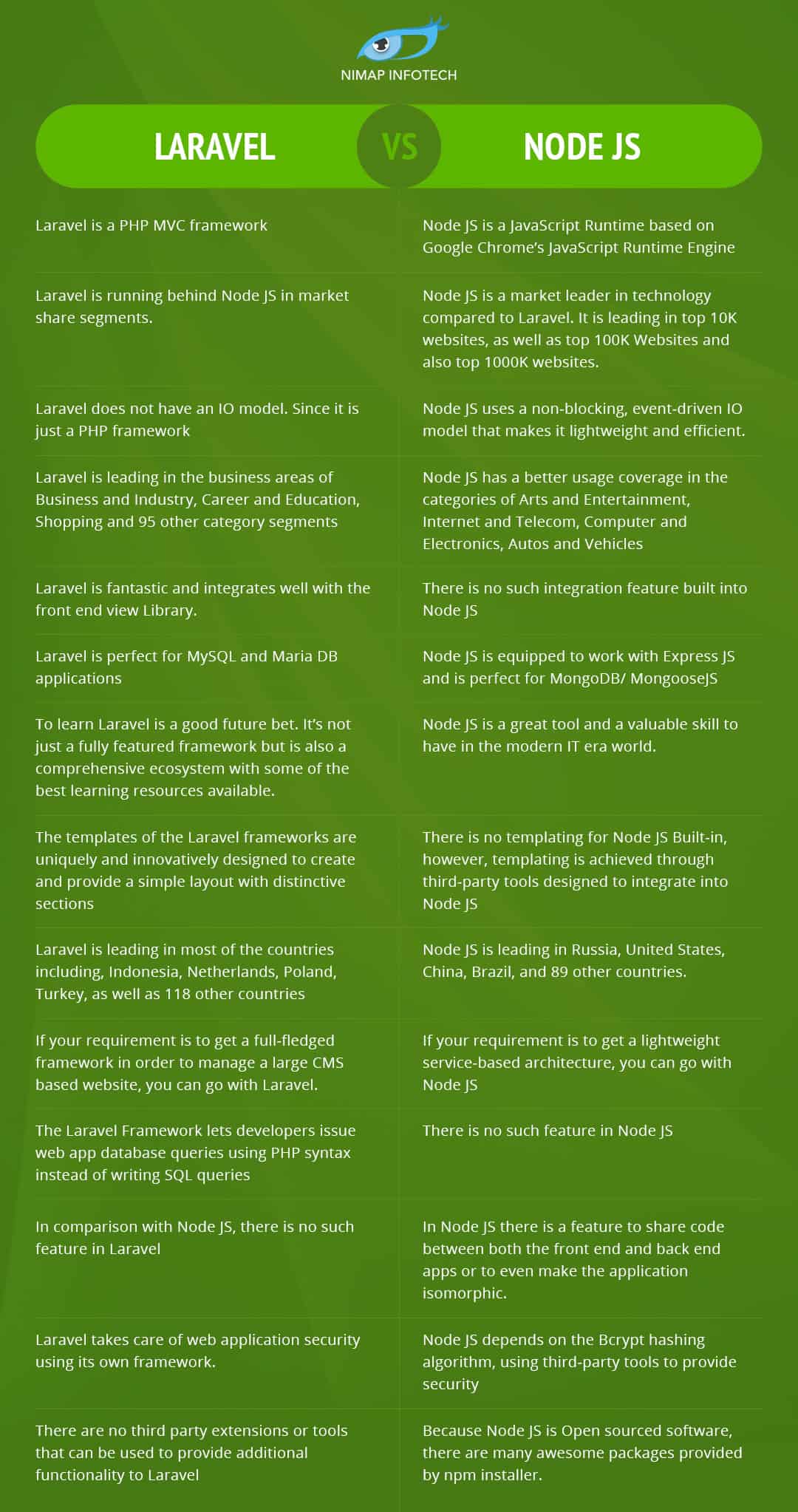In this article we are going to compare side by side two new technologies designed to make computing and problem solving easy, these are Laravel and NodeJS (Laravel VS NodeJS).
Decoding Development: Laravel vs. Node.js – Unveiling the Differences and Choosing the Superior Framework
Table of Contents
ToggleLaravel Introduction:
So what is Laravel? Laravel is a PHP-based framework built for designing high-end Web Applications. Laravel comes with a strong collection of tools and provides an elegant application architecture for designing web applications. Moreover, Laravel combines all of the significant characteristics found in major frameworks such as ASP.NET MVC, Ruby on Rails, CodeIgniter, etc. The Laravel framework is developed using Open Source standards. This framework is capable of saving huge development time by preventing the developers from thinking and planning the entire website architecture from scratch. Laravel is also able to take care of the security of the application. All of these features can boost the development pace for creating a Website from scratch.
If any developer is familiar with PHP syntax and features, Laravel can speed up the learning time for developers. Laravel enables you to craft your work more easily.
Laravel is developed to provide simplistic development for web applications. Robust and secure development are some of the key characteristics that Laravel provides. Laravel is known to speed up the development process in record time thus saving valuable time of developers.
Here are some facts and features about Laravel:
- Laravel was developed by Tailor Otwell in July 2011 and is one of the most popular open-source PHP frameworks right after CodeIgniter.
- It follows the Model-View-Controller (MVC) pattern architecturally
- It is nothing but a web-based framework using PHP
- Its goal is to make certain parts of the web development process easier
- It provides various tools for MVC applications, database interactions, HTML templates, routing, testing and much more
- It makes the web development process far easier for web designers and developers.
NodeJS Introduction
NodeJS is a server-side platform that is built on Chrome’s JavaScript runtime libraries. Node JS is built using Google Chrome’s JavaScript Engine (V8 Engine). Using NodeJS, developers can create cross-platform, server-side, networking applications easily. Ryan Dahl invented Node JS in 2009.
Characteristics of Node JS
- Makes use of an event-driven, Non-blocking IO model and therefore makes it a lightweight and efficient platform to build applications on.
- It is perfect for designing data-intensive real-time applications that can be deployed across distributed devices.
- Provides developers with a rich library of various JavaScript modules that simplify the development of web-based applications to a great extent.
The following are some of the Node JS Features that you might want to have a look at.
- It is a JavaScript Runtime
- It uses a non-blocking IO model that is both event-driven and efficient
- Npm is a NodeJS package library which is both open source and the largest in the world
- Node JS is designed to build scalable networked applications using open-source technologies.
- Node JS’s connection handling mechanism is more efficient than the classic thread-based model
- Users of NodeJS are free from the worries of deadlocking the process since there is no lock concept here.
- Scalable systems can easily be developed using Node JS.
Also Read: AngularJS VS Node JS
Let us compare Laravel and NodeJs side by side as a table looking at their pros and con’s:
Laravel VS NodeJS

Advantages of Laravel and Node.Js
Advantages of Laravel
Mentioned below are the benefits of Laravel.
Excellent writing
Because of its extensive documentation, Laravel is thought to be developer-friendly. All Laravel versions come with comprehensive documentation that provides clear and in-depth descriptions of the classes, coding conventions, and methods.
Development of authentication and authorization systems
Every web application owner must ensure that users are who they say they are to stop unauthorized users from accessing the secured resources. Implementing authentication is relatively simple with the Laravel framework. Almost everything comes pre-configured. The framework offers a straightforward method of setting up authorization logic and restricting resource access.
Reversing Direction
It is also Laravel’s most exquisite feature. You may do this to make connections to named routes. Users may quickly build links using the route’s name, and the framework will automatically enter the correct URL. If the user modifies the route, it will affect everyone.
Integration of Mail Services
After various incidents, users’ emails may receive alerts from the mail service. It is impossible to conceive a modern online application, for instance, that does not provide a new user with a straightforward email confirming their successful registration on a website. Over the well-known SwiftMailer library, the framework offers a direct, concise API.
Additionally, it offers drivers for Mailgun, Amazon SES, and other services, enabling an app to start delivering emails right away using a local or cloud-based service. It supports sending alerts via various delivery methods, including SMS and Slack.
Advantages of Node Js
The main benefits of utilizing Node.js for server-side development are as follows:
Node.js provides Simple Scalability.
One of the main benefits of Node.js is that programmers find it simple to grow applications horizontally and vertically. By adding further nodes to the current system, the applications may be expanded horizontally.
Additionally, Node.js gives you a choice to add additional resources to individual nodes while vertically growing the application. As a result, it offers more significant options than other JavaScript servers and is very scalable.
Budget-Friendly With Full-Stack JavaScript:
Node.js makes it incredibly simple for programmers to create both JavaScript code for the front-end and server side. One of the biggest benefits of using node.js is that it eliminates the need to hire two resource teams, saving time, money, and resources for the development of the entire project.
Allows us the freedom to create apps
The Node.js benefits helped LinkedIn’s development team record a performance boost after switching from Ruby on Rails. They cut the number of servers from 30 to only 3. They started delegating and using resources more effectively, changing their attention from app development to troubleshooting.
The flexibility to create software and apps is another benefit that Node.js provides to developers.
Highly Extensible
Because Node.js is well renowned for being extremely expandable hence users may alter and further enhance it to suit their needs.
JSON may also be used to define the parameters for data flow between a web server and a client. Moreover, it is also built-in APIs that make it easier to create HTTP, TCP, DNS, and other types of servers.
I suggest reading the post where I have discussed: Why Laravel Is Perfect for Web Development
Also Read: Pros and Cons of Laravel
Conclusion:
We hope you have enjoyed reading this article. If you found this article useful, do check out our other posts. If you’re looking to hire NodeJS developers or to hire Laravel developers, we will hook you up to our most experienced back-end team, to solve your programming problems or to develop a website from scratch. If you are looking for NodeJS Development Company visit this link.
Author
-

A technology enthusiast with over 14+ years of hands-on experience in the IT industry, I specialize in developing SaaS applications using Microsoft Technologies and the PEAN stack. I lead a team of 300+ engineers, holding multiple Microsoft certifications (MCSD, MCTS, MCPS, MCPD). My expertise spans across C#, ASP.NET, NodeJS, SQL Server, and Postgres.
View all posts








